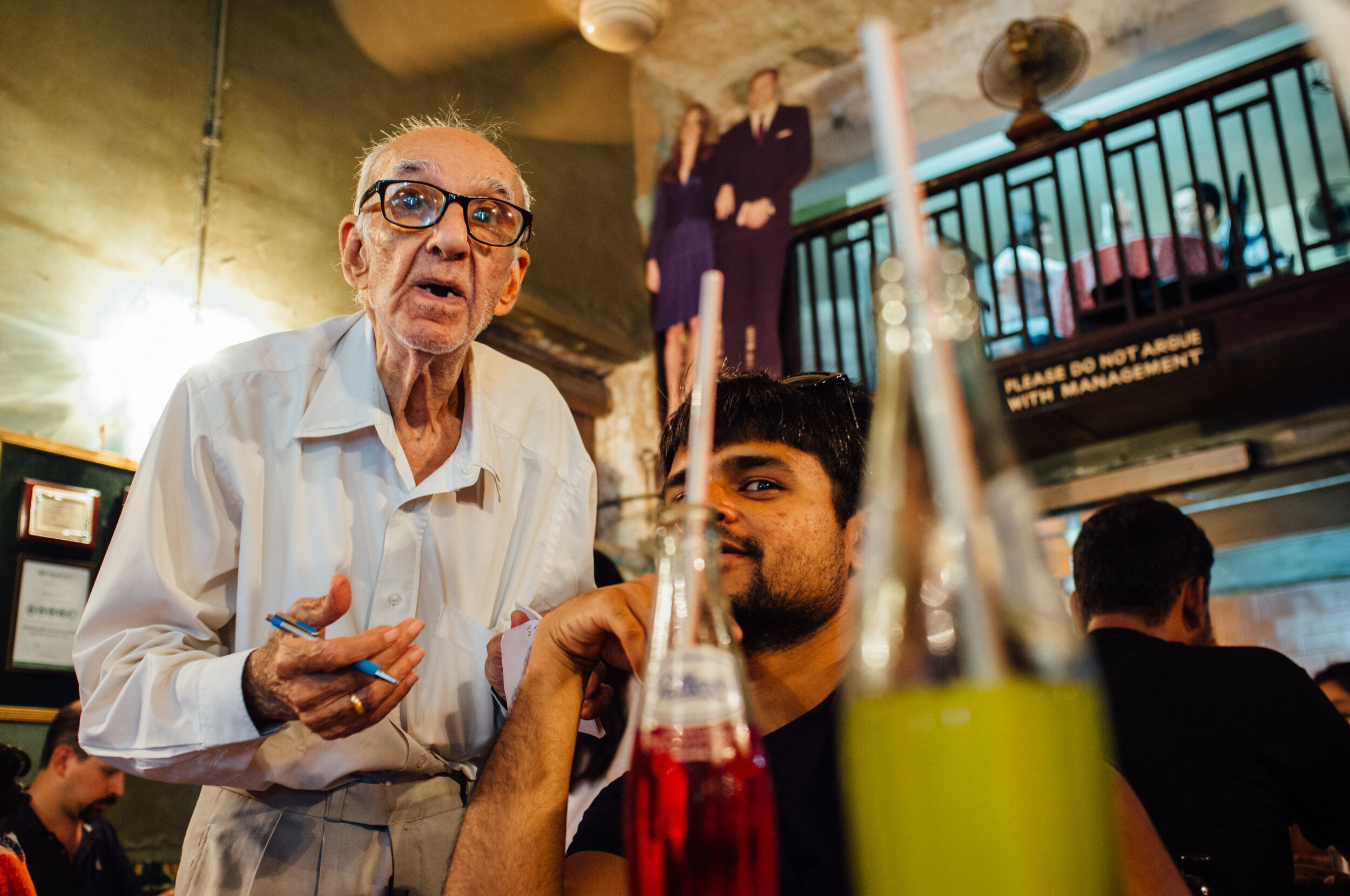Britannia & Co.
{Ballard Estate, Est. 1923}
Many cafes have closed; in the 40s, 50s and 60s we had about three to four hundred Irani restaurants, bakeries, stores in Bombay.
Boman Kohinoor, Britannia & Co, Ballard Estate
__________________________________
Britannia Café was established by my father Rashid in the year 1923 and it happened to be the birth year, the year, I was born in this year, now nearly 84 years. The Zoroastrians who remained in Iran were under attack, so they had to carry on their life in villages, and most of them became farmers, and, uh, slowly there came to be short supply of water, actually they came from Yazd, my family. And Yazd was…water was very hard to get. Slowly there was no rainfall, and the water they were getting from the mountains also was drying up. So, they abandoned the villages and go for greener pastures.
So, the Parsis of India, they told the Zoroastrians of Iran if they would come to Mumbai, to Bombay, they would support them and that is why they came to India. Not being educated my father could not do any other work except the Parsis told him to start with some tea business, to prepare and serve tea, and uh, the Parsis helped them in the business and slowly they prospered. Actually, they gave them help to set up their stalls, and slowly the stalls gave way to small cafes, and then to restaurants and bakeries.
The Parsis had come 1075 years ago, and they had adopted the Indian culture, and they were very loyal to the British when they were here during the time of Raj. The Parsis of India, they mixed with the Indians and during British time they attended schools, got educated, they became engineers, lawyers, but the Iranis coming later did not get themselves educated, but they adopted this Parsi culture because our religion is same.
Parsis, originally, they themselves being very cultured, they mixed with the British people, very well, the British also gave them support and help. Well, the British did that maybe for a political purpose, they did so because they themselves were foreigners here, they could mix better with the Parsis than with some of the Indians.
Many cafes have closed; in the 40s, 50s and 60s we had about three to four hundred Irani restaurants, bakeries, stores in Bombay, but slowly they are diminishing, and now they are on the verge of vanishing. I think only about twenty, thirty Irani restaurants are left today.
Eating habits have changed, in the sense that formerly in the British time our restaurant was serving continental type food, bland food, and the Europeans and high society type of people were not eating spicy food, but now, after independence, we had to change, we had to cook food according to Indian tastes – with spices, and masala and all those things. So, biriyani has become popular, pilau has become popular, and mutton, and gravy, gravy cutlets have become more popular than during the past. We used to have beef steak, what they call chops, fish and chips, all those things, but now they are not a part of our menu at all.
Gandhiji came in power and he became a political father figure of India, then they brought about independence, he said all of us are children of God, why should there be this difference? All restaurants to be open for all castes and communities. That forced us to put up a board, saying there was no restriction for any caste or colour.
When Iranis started coming to India, especially to Mumbai, there were a lot of vacant premises, and most of the corner premises were vacant, this may be superstitious, but the Hindus would not take the corner, saying that it was very unlucky for them, so the Iranis were coming, and they would find the corners better for business, and so they started renting them. My grandfather started Kohinoor Restaurant, just near Bombay GPO. It was one of the first Irani restaurants in the city, about 1890,'95, around that time.
__
From an interview with Boman Kohinoor, Ballard Estate, Mumbai, April 2007
Boman Kohinoor expired in Mumbai in September, 2019.
Download an interview transcript


2007


2015

2016

2016

2016

2007

2014

2007
_____________________________________
IMAGES: top to bottom:
BOMAN KOHINOOR WITH SONS AFSHIN, left, and ROMIN, right. A portrait of Boman's father RASHID hangs above, 2007, photographer Bruce Carter, copyright Bruce Carter
BRITANNIA, Ballard Estate, 2015, photographer Ivo Daskalov, copyright Ivo Daskalov
BRITANNIA, Ballard Estate, 2016, photographer Mamiko Oka, copyright Mamiko Oka
BOMAN KOHINOOR, BRITANNIA, Ballard Estate, 2016, photographer Premshree Pillai, copyright Premshree Pillai
BRITANNIA, Ballard Estate, 2016, photographer Mamiko Oka, copyright Mamiko Oka
BRITANNIA & Co., Ballard Estate, 2007, photographer Bruce Carter, copyright Bruce Carter
BRITANNIA, Ballard Estate, 2014, photographer Clay Hensley, copyright Clay Hensley
KOHINOOOR RESTAURANT, Fort, 2007, photographer Bruce Carter, copyright Bruce Carter

